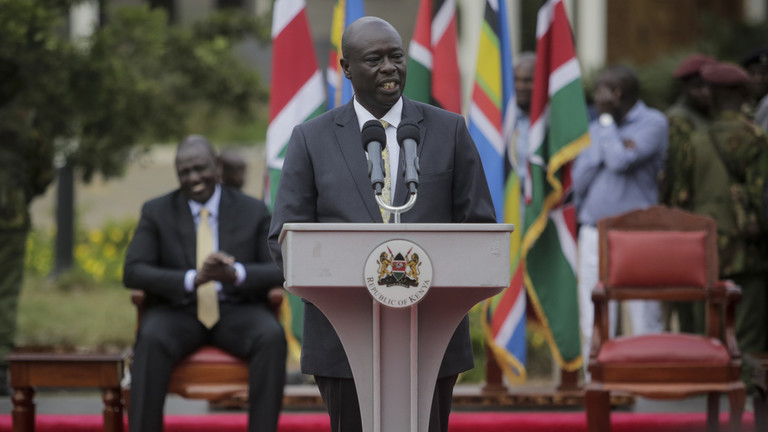Africa
Kenyan Vice President Faces Impeachment

Kenya’s Vice President is facing impeachment proceedings, causing political tension across the country. Learn about the charges and the potential impact on Kenya’s political landscape.
Kenyan lawmakers have submitted a petition to impeach Vice President Rigathi Gachagua, accusing him of corruption, undermining the government’s authority, intimidating public officials, and participating in ethnically divisive politics.
The motion put forward by supporters of President William Ruto was presented in the National Assembly on Tuesday. Member of Parliament Mwengi Mutuse, who brought the motion to the table, stated that 291 out of his 349 fellow lawmakers had endorsed it, significantly surpassing the one-third needed to proceed with a vote on Gachagua’s dismissal.
Parliamentary Speaker Moses Wetang’ula referred to it as a “special motion” that represents an extraordinary constitutional moment in Kenyan democracy. He announced that the lower chamber will hold a public session regarding the impeachment process on Friday, during which the vice president will be invited to parliament to address the charges on October 8.
Kenya’s government has been in turmoil since June due to deadly protests sparked by a cost-of-living crisis and a finance bill, which was subsequently withdrawn, that aimed to generate $2.7 billion in taxes.
READ ALSO:Ruto Commends Kenyan Police Force During Official Visit to Haiti
Allies of President Ruto have alleged that his deputy, Gachagua, is responsible for inciting the anti-government unrest due to a growing rift between them. However, Gachagua has dismissed these accusations and stated that he feels marginalized by the president. Tensions surfaced when Ruto included members from opposition leader Raila Odinga’s party in the “national unity government” established following the anti-tax protests.
Gachagua, hailing from the Mount Kenya region—the largest voting bloc in the African nation—played a crucial role in helping Ruto secure victory in the 2022 presidential election. The 59-year-old politician, known for describing himself as a “truthful man,” opposed former President Uhuru Kenyatta’s preferred successor, then-Prime Minister Raila Odinga. Instead, he supported Ruto when he was serving as Kenya’s deputy president.
Nevertheless, he has allegedly upset certain members of Ruto’s coalition by frequently likening the government to a business and implying that those who supported the president in the election should have priority for public sector jobs and projects.
Lawmaker Mwengi stated during the presentation of the impeachment document to parliament on Tuesday that “Gachagua has inexplicably accumulated a vast property portfolio, largely suspected to be derived from corruption and money laundering.”
The AFP reports that the petition outlines 11 reasons for impeaching the vice president, among them allegations of unlawfully amassing 5.2 billion shillings ($40 million) over two years while earning an annual salary of $93,000.
Should the motion succeed, Gachagua will be the first deputy president to be impeached under Kenya’s revised 2010 constitution. In contrast, Josephat Karanja, who was vice president in 1989, resigned after being accused of plotting to destabilize the presidency and abusing his power.
In an interview with Reuters, Macharia Munene, a professor at the United States International University in Nairobi, asserted that the petition for Gachagua’s removal is an effort by the Kenyan government to divert attention from its shortcomings.
Munene suggested that creating a crisis under the pretext of needing to address issues with the deputy president is an effective strategy for diverting attention from other crises.
